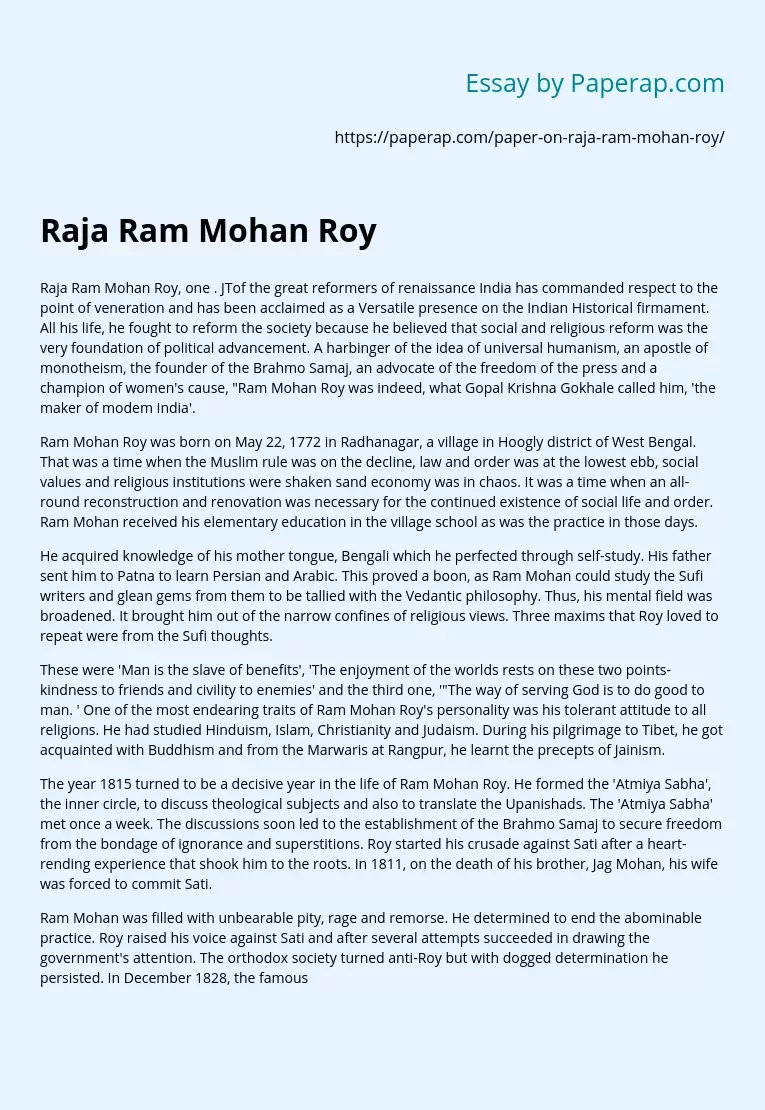Raja Ram Mohan Roy
Raja Ram Mohan Roy, one . JTof the great reformers of renaissance India has commanded respect to the point of veneration and has been acclaimed as a Versatile presence on the Indian Historical firmament. All his life, he fought to reform the society because he believed that social and religious reform was the very foundation of political advancement. A harbinger of the idea of universal humanism, an apostle of monotheism, the founder of the Brahmo Samaj, an advocate of the freedom of the press and a champion of women’s cause, “Ram Mohan Roy was indeed, what Gopal Krishna Gokhale called him, ‘the maker of modem India’.
Ram Mohan Roy was born on May 22, 1772 in Radhanagar, a village in Hoogly district of West Bengal. That was a time when the Muslim rule was on the decline, law and order was at the lowest ebb, social values and religious institutions were shaken sand economy was in chaos. It was a time when an all-round reconstruction and renovation was necessary for the continued existence of social life and order.
Ram Mohan received his elementary education in the village school as was the practice in those days.
He acquired knowledge of his mother tongue, Bengali which he perfected through self-study. His father sent him to Patna to learn Persian and Arabic. This proved a boon, as Ram Mohan could study the Sufi writers and glean gems from them to be tallied with the Vedantic philosophy. Thus, his mental field was broadened. It brought him out of the narrow confines of religious views.
Three maxims that Roy loved to repeat were from the Sufi thoughts.
These were ‘Man is the slave of benefits’, ‘The enjoyment of the worlds rests on these two points-kindness to friends and civility to enemies’ and the third one, ‘”The way of serving God is to do good to man. ‘ One of the most endearing traits of Ram Mohan Roy’s personality was his tolerant attitude to all religions. He had studied Hinduism, Islam, Christianity and Judaism. During his pilgrimage to Tibet, he got acquainted with Buddhism and from the Marwaris at Rangpur, he learnt the precepts of Jainism.
The year 1815 turned to be a decisive year in the life of Ram Mohan Roy. He formed the ‘Atmiya Sabha’, the inner circle, to discuss theological subjects and also to translate the Upanishads. The ‘Atmiya Sabha’ met once a week. The discussions soon led to the establishment of the Brahmo Samaj to secure freedom from the bondage of ignorance and superstitions. Roy started his crusade against Sati after a heart-rending experience that shook him to the roots. In 1811, on the death of his brother, Jag Mohan, his wife was forced to commit Sati.
Ram Mohan was filled with unbearable pity, rage and remorse. He determined to end the abominable practice. Roy raised his voice against Sati and after several attempts succeeded in drawing the government’s attention. The orthodox society turned anti-Roy but with dogged determination he persisted. In December 1828, the famous regulation was passed which declared the practice illegal and punishable as a criminal offence. Once Sati was abolished, women’s lot drew Ram Mohan’s attention. It was a time when women had no voice.
They were considered inferior, unworthy of trust and devoid of knowledge. He wrote extensively on women’s rights and once again incurred the wrath of the orthodox society. His plea for the rights of females shows that he was a strong supporter of women’s uplift. He fought for their legal rights to property; he took up the cause of the destitute women; he raised his voice against the sale of daughters to prospective husbands due to pecuniary interests and he condemned the system of polygamy. In 1830, he sailed for England along with his adopted son.
Raja Ram, then a boy of 12, and two servants. He visited Manchester, Bentham and Liverpool besides London. The main objective of his visit to England was to press for certain important reforms for India. After his stay in London, he went to Bristol where he died on September 27, 1833, after a brief illness. His passing away was deeply mourned by his admirers. He believed in the divine unity of mankind because he was deeply religious and had faith in the divinity of man, irrespective of caste or creed.
Raja Ram Mohan Roy. (2018, Jul 31). Retrieved from https://paperap.com/paper-on-raja-ram-mohan-roy/

